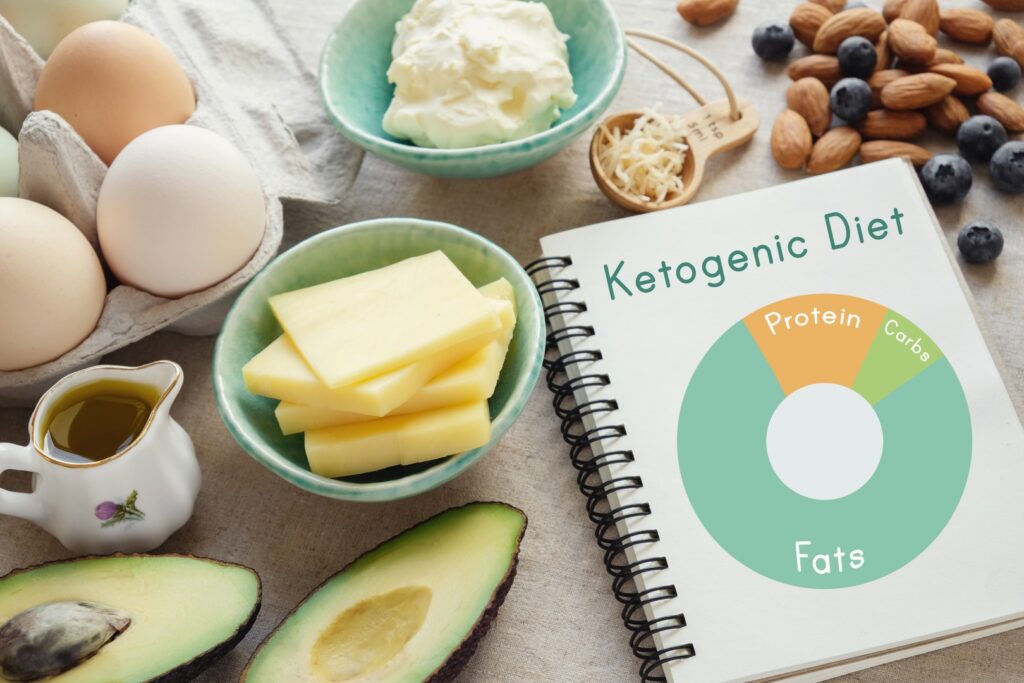The keto diet or ketogenic diet is a high-fat, low-carbohydrate diet that has been shown to provide numerous health benefits. This diet is beneficial for weight loss and enhancing life quality. Several studies indicate that a ketogenic diet may also be beneficial against cancer, epilepsy, Alzheimer’s disease, and diabetes.

What is a ketogenic or keto diet?
This is essentially a low-carb diet with increased fat and protein consumption. The emphasis is on obtaining energy from fats and proteins as opposed to carbohydrates. This diet is comparable to standard low-carb diets and the Atkins diet.
The objective is to achieve a metabolic state called ketosis. This can be accomplished by drastically reducing carbohydrate consumption and replacing them with fats and protein. When this stage is reached, the body becomes extremely efficient at burning fats for energy. The brain is supplied with energy when the liver converts fats into ketones. The body’s metabolism shifts from carbohydrates to ketones and fat. In general, a ketogenic diet consists of low-carb vegetables, cheese, eggs, butter, fish, avocados, nuts, and heavy cream. Simultaneously, almost all carbohydrate sources are removed, including high-carb vegetables, milk, potatoes, rice, grains, beans, sweets, cereals, etc.
How can it aid in weight loss?
This diet is one of the most effective methods for losing weight healthily. As a person achieves a healthy weight, the risk of additional ailments decreases. The suggested low-fat diet pales in comparison to the ketogenic diet. This diet is not only excellent but also satiating. Keeping track of the calorie count does not consume unnecessary time. Two-to-two-and-a-half times more likely to lose weight than those on a standard low-fat diet, according to research, are those on a ketogenic diet.
Important factors contributing to weight loss:
Following a ketogenic diet results in an increase in protein consumption, which aids in weight loss.
Eliminating specific meal selections – reducing your carbohydrate consumption reduces your dietary options. This may result in a decrease in caloric intake and weight loss.
Gluconeogenesis (GNG) – Since carbohydrate intake is decreased, the body must create glucose from non-carbohydrate sources.
Lowers lipogenesis – A ketogenic diet reduces lipogenesis, the process by which sugar is converted into fat. The pace at which fat is burnt increases, and the quantity of fat burned daily increases significantly.
Dietary ketosis and metabolic illnesses: Adopting a ketogenic diet may assist in eliminating or preventing my metabolic diseases. There are five primary risk factors that may contribute to type-2 diabetes, obesity, and heart disease. Included among the risk factors are abdominal obesity, high levels of bad cholesterol, low levels of good cholesterol, high blood sugar, and high blood pressure. In some manner, a ketogenic diet is good for several conditions. It helps to reduce insulin levels, which is beneficial for diabetic patients (type2).

Ketogenic diet advantages for the metabolic system:
Reduced carbohydrate consumption; a high carbohydrate diet leads to impaired cell function due to an increase in insulin and blood sugar levels.
Reduced insulin resistance – inflammation, weight gain, and elevated triglycerides are the results of decreased insulin resistance. As the ketogenic diet necessitates the intake of healthy fats, levels of good cholesterol are boosted.
Reduction of chronic inflammation – metabolic syndrome and several illnesses are associated with inflammation. A ketogenic diet reduces chronic inflammation and aids in disease prevention.
This diet aids in fat burning and aids in the elimination of belly fat, which is detrimental to a healthy metabolic system.
Fundamental principles of the Ketogenic Diet:
- Less than 50 grammes of carbohydrates per day – the cardinal guideline of a ketogenic diet is to drastically restrict carbohydrate consumption. The goal should be fewer than 50 grammes of carbohydrates each day.
- When you run out of the essentials of a ketogenic diet, you are more likely to stray from the diet. Therefore, you should constantly store up on basics such as almonds, eggs, meat, fish, avocados, etc.
- Consume a great deal of veggies – consume a great deal of vegetables that are low in carbohydrates but rich in fibre to prevent hunger pangs.
- Continue experimenting with your diet and do not allow it to get monotonous. You may consume the same food, but you should experiment with the recipes.
- Experiment with your diet; continue experimenting with your diet until you discover the optimal combination.
- Plan ahead; if you do not plan out your diet beforehand, you will fail.
- Maintain a record of your progress – it is necessary to maintain a record of your progress in order to remain continually motivated.
- You must be constant in your efforts in order to reach your objectives. Abstain from giving in to temptations and adhere to your eating plan.
Is a ketogenic diet appropriate for you?
There is no particular diet that is appropriate for everyone. Considering that everyone’s anatomy is distinct, even the anatomy of identical twins, this is pretty clear. However, a ketogenic diet may be particularly advantageous for those who are obese and at risk for metabolic syndrome. If you detest eating fatty foods and need carbohydrates, this diet may not be for you. Even so, if you want to attempt a low-carb diet, you may try the standard low-carb diets, such as carb cycling, etc. This diet calls for much self-control and discipline. You may even get ill if you do not adhere to this diet correctly. This may not be the most advantageous alternative for sportsmen and bodybuilders. Due to the significant role played by the intake of meat, fish, eggs, and dairy products, this diet may also be rather difficult for vegetarians and vegans.
Other advantages of the Keto Diet
Several of the potential health advantages of following a ketogenic diet are listed below.
- A ketogenic diet reduces blood sugar, blood pressure, and bad cholesterol, all of which are adverse to heart health.
- Utilized in the treatment of cancer; this diet is being used to treat several forms of cancer and reduce tumour development.
- This diet is beneficial for Alzheimer’s sufferers since it slows the growth of the illness and may also alleviate its symptoms.
- This diet is reported to significantly decrease epilepsy in children
- Following a ketogenic diet reduces Parkinson’s disease symptoms as a treatment for the condition.
- As this diet significantly reduces insulin levels, it may play a crucial role in polycystic ovary syndrome.
- Extremely useful for neurological, metabolic, and insulin-related illnesses.
- As the ketogenic diet lowers insulin levels by reducing the consumption of sugar and processed foods, it helps to minimise acne.



